Book contents
- Frontmatter
- Contents
- Acknowledgements
- Introduction
- PART ONE THE COMING OF EMPIRE 1800–1879
- The Ottoman Empire and Egypt
- 1 The Spirit of the East
- 2 Eothen
- 3 The Crescent and the Cross
- 4 Eastern Life, Present and Past
- 5 Visits to Monasteries of the Levant
- 6 Letters from Egypt
- Arabia
- Persia
- PART TWO COLONIALISM AND RESISTANCE 1880–1950
- Bibliography
2 - Eothen
from The Ottoman Empire and Egypt
Published online by Cambridge University Press: 05 March 2012
- Frontmatter
- Contents
- Acknowledgements
- Introduction
- PART ONE THE COMING OF EMPIRE 1800–1879
- The Ottoman Empire and Egypt
- 1 The Spirit of the East
- 2 Eothen
- 3 The Crescent and the Cross
- 4 Eastern Life, Present and Past
- 5 Visits to Monasteries of the Levant
- 6 Letters from Egypt
- Arabia
- Persia
- PART TWO COLONIALISM AND RESISTANCE 1880–1950
- Bibliography
Summary
For a writer often credited with radically changing the style of earlier nineteenth-century English travel writing, Alexander William Kinglake had a surprisingly conventional background and upbringing, and lived the largely uneventful life of a Victorian gentleman. Born into a well-off family in Taunton Somerset, like his father he went into the law, though without any great success. Eton and Cambridge would have strengthened a predilection for Classics first given him by his mother and which is inscribed in the Greek title (‘from the East’) of his celebrated work of travel. Eothen, or, Traces of Travel Brought Home from the East was published in 1844, a decade after its author set out on a tour of the Levant. It is the product of a young, unattached Englishman confident in the superiority of his class, race and nation. Rejected by the publisher John Murray on account of its irreverent style, ‘it had undergone more than thirty printings by the end of the century’ (Corwin, DLB/166: 191). In the preface Kinglake made it clear he had intentionally produced a travel book that ‘was quite superficial in character’ having ‘discarded from it all valuable material derived from the work of others.’ However, while displaying his ‘egoism and colonial attitudes’ these are ‘continually undercut by his irony’ (Baker LTE: 677) and self-mockery. At the Catholic church in Tiberias, for example, the English gentleman sneers at the genuflections of a local ministrant only to break into a lament over ‘the fleas of all nations’ consuming his flesh.
- Type
- Chapter
- Information
- Travellers to the Middle EastAn Anthology, pp. 12 - 16Publisher: Anthem PressPrint publication year: 2009



